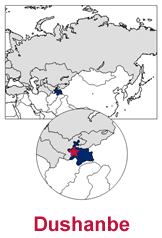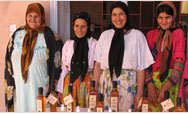Tajikistan

SNAPSHOT
Date of independence: 1991
Capital: Dushanbe
Population: 6.7 million (2007)
Income per person: $460 (yr)
Source: World Development Indicators 2007
USAID/CENTRAL ASIA SITE
http://centralasia.usaid.gov
CONTACTS
Regional Mission Director
William Frej
USAID/Central Asia
41 Kazibek bi St
Almaty, Kazakhstan 050010
Tel: 7-327-250-79-12
Carolyn Bryan
Country Program Officer
USAID
109 "A" Ismoili Somoni Ave.
Dushanbe, Tajikistan 734019
Tel: 10-922-372-292-000
Bob Wallin
Central Asia Team Leader
Tel: 202-712-0141
Email: bowallin@usaid.gov
 Unemployed mother of six Saodat Sharipova was among the many Tajiks struggling to survive the severe cold during the energy crisis in the winter of 2007. Many families, especially in the cities, lived on one meal a day—or even less. USAID distributed gas stoves, gas balloons, coal, and warm blankets to hospitals, orphanages, nursing homes, homeless shelters, and the poorest households. "I was afraid my children would freeze to death," says Sharipova, whose apartmenthad no heating or electricity for months. "The donated gas balloon and stove were a big support for us." (Photo: Mercy Corps)
Overview
Tajikistan is a small, landlocked country balancing considerable pressures in a changing region. While relatively stable, the country is increasingly suffering from low economic productivity, high unemployment, and extreme poverty. These conditions, coupled with the shortage of electrical power and gas, resulted in a severe humanitarian crisis last winter. The international community is concerned that, due to the low water levels, the upcoming winter will be even worse. The USAID program in Tajikistan focuses on supporting economic growth (including agricultural productivity), health, education, political reform, and democratic institutions.
Programs
Economic Growth: Strengthening Tajikistan's Economy
USAID helps farmers increase agricultural production and improve the management of on-farm water and irrigation networks. Agricultural production assistance has already benefited 85,000 people and earned $1 million in income for participating farmers in 2006. USAID also supports the creation of agricultural value chains and provides critical financing, support services, and training to farmers. To reduce regulatory and administrative constraints for businesses, USAID facilitates dialogue between the government and the private sector and supports small and medium enterprises, business associations, accounting training, business education, and microfinance institutions. With USAID assistance, Tajikistan’s association of microfinance organizations doubled its member loan portfolio to $26 million in 2007. To facilitate regional trade and Tajikistan’s accession to the World Trade Organization, USAID helps reduce trade barriers and expand access to market information. Assistance also targets improvements in the handling of budgetary and macroeconomic issues, tax administration, monetary policy, and banking supervision. Other programs focus on commercial law reform and improvements to land tenure legislation. Further, USAID facilitates the development of a regional electricity market and helps in reforming the country’s electricity sector.
Investing in People: Quality Health Care and Education
Over the years, the United States has assisted Tajikistan in dealing with multiple health emergencies. In 1997, USAID helped fight a typhoid outbreak and has been helping reduce malaria incidence. From 2001 to 2004, USAID screened nearly 300,000 children for malnutrition and provided food supplements. Currently, assistance focuses on health system reforms to ensure quality, client-oriented, evidence-based, and cost-efficient primary health care services, as well as implementation of infectious disease prevention programs, including tuberculosis (TB), HIV/AIDS, and avian influenza. USAID assists in implementing HIV/AIDS grants from the Global Fund to Fight AIDS, TB, and Malaria and supports the training of health professionals and officials in HIV/AIDS prevention, treatment, and policy making. USAID TB programs reach over 26 percent of the country’s population and help improve TB diagnostics and treatment. USAID supports the implementation of the World Health Organization–recommended live birth definition. Thanks to USAID initiatives, in 2005, 92 percent of health facility staff were able to correctly manage deliveries. More than 600,000 Tajik labor migrants received information on labor issues and health to prevent the spread of drug addiction and infectious diseases.
To improve primary and secondary education, USAID helps implement the Education for All grant, reform education financing, and introduce teaching methods that stress critical thinking and active learning. These programs have trained approximately 2,000 teachers.
Governing Justly and Democratically
With the emergence of independent media, USAID has helped draft and improve media legislation, trained media managers and journalists, and assisted with the creation of the National Association of Independent Mass Media. USAID continues to support the production of local programs. To strengthen local nongovernmental organizations (NGOs), USAID has provided training, information, networking opportunities, and other assistance to local NGOs and has taught civic education to over 50,000 students. Professionals from various sectors receive opportunities for training in the United States. Through the Eurasia Foundation, USAID provides small grants to NGOs to strengthen private enterprise, civil society, public administration, and education. With support from USAID, 67 municipalities have improved the provision of services, including better water supply and garbage disposal, and they have expanded the involvement of residents in local decision making.
Back to Top ^
|




